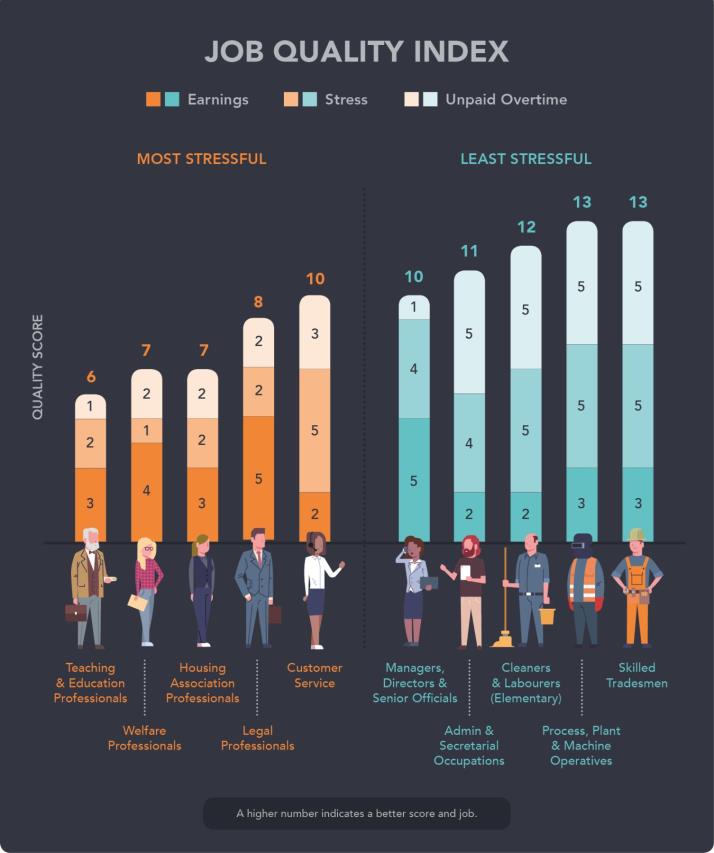Are you suffering from workplace stress? Well, you’re not alone ‘ 3/5 UK employees suffer from stress, and more than half (54%) have trouble sleeping because of it.
But have you ever stopped to consider how stressful your job is compared to the rest of the UK? With the average Brit spending 3,507 days at work over their lifetime, Workwear Giant have uncovered just how the UK’s occupations compare in terms of stress.
Work-related Stress Accounts for 57% of Sick Days in the UK
The impact
Not only is this damaging to the employee suffering from stress but also for the employers too. Employee turn-over is currently at an all-time high, with 46% of Brits reporting that they’ve searched for a new job because of stress.

Workwear Giant have also created a Job Quality Index which has revealed surprising data ‘ careers that are considered aspirational, such as teaching or welfare, are in fact amongst the lowest overall job quality. But how was the Job Quality Index calculated ‘ you ask?
After investigating each occupation’s average earnings, stress levels and unpaid overtime ‘ each of the three dimensions was scored out of 5 against the UK’s national average. For example, being scored 5 indicates a better score and higher job quality.
As of March 2019, the national averages are as stands:
‘ National average wage – £24,000 per annum
‘ National average cases of stress ‘ 1,320 cases per 100,000 people
‘ National average unpaid overtime ‘ 7.5 hours a week
So, how does your job compare? Read on to discover.
Top 5 Most Stressful Job Sectors
The results are as follows:
Teaching & Education Professionals
‘ Earnings – £25,692 p/a (£1,692 more than the national avg) = 3/5
‘ Stress ‘ 3,020 reported cases of stress per 100,000 people (1,700 cases more than the national avg) = 2/5
‘ Unpaid overtime ‘ 12.5 hours a week (5 hours more than the national avg) = 1/5
‘ Total Score = 6/15
Welfare Professionals
‘ Earnings – £34,200 p/a (£10,200 more than the national avg) = 4/5
‘ Stress ‘ 4,080 cases of stress per 100,000 people (2,760 cases more than the national avg) = 1/5
‘ Unpaid overtime ‘ 8.6 hours a week (1.1 hours more than the national avg) = 2/5
‘ Total Score = 7/15
Housing Association Professionals
‘ Earnings – £24,012 p/a (£12 more than the national average) = 3/5
‘ Stress – 3,050 cases of stress per 100,000 people (1,730 cases more than the national avg) = 2/5
‘ Unpaid overtime ‘ 8.6 hours a week (1.1 hours more than the national avg) = 2/5
‘ Total Score = 7/15
Legal Professionals
‘ Earnings – £69,992 p/a (£45,992 more than the national avg) = 5/5
‘ Stress ‘ 3,040 cases of stress per 100,000 people (1,720 cases more than the national avg) = 2/5
‘ Unpaid overtime ‘ 9.6 hours a week (2.1 hours more than the national avg) = 2/5
‘ Total Score = 8/15
Customer Service
‘ Earnings – £20,735 p/a (£3,265 less than the national avg) = 2/5
‘ Stress ‘ 2,770 cases of stress per 100,000 people (1,450 cases more than the national avg) = 3/5
‘ Unpaid overtime ‘ 0 hours a week (7.5 hours less than the national avg) = 5/5
‘ Total Score = 10/15
Top 5 Least Stressful Job Sectors
Managers, Directors & Senior Officials
‘ Earnings – £43,425 p/a (£19,425 more than the national avg) = 5/5
‘ Stress ‘ 1,200 cases of stress per 100,000 people (120 cases less than the national avg) = 4/5
‘ Unpaid overtime ‘ 9.2 hours a week (1.7 hours more than the national avg) = 1/5
‘ Total Score = 10/15
Admin & Secretarial Occupations
‘ Earnings – £23,207 p/a (£793 less than the national avg) =2/5
‘ Stress ‘ 1,310 cases of stress per 100,000 people (10 cases less than the national avg) = 4/5
‘ Unpaid overtime ‘ 0 hours a week (7.5 hours less than the national avg) = 5/5
‘ Total Score = 11/15
Cleaners & Labourers (Elementary)
‘ Earnings – £20,030 p/a (£3,970 less than the national avg) = 2/5
‘ Stress ‘ 780 cases of stress per 100,000 people (540 cases less than the national avg) = 5/5
‘ Unpaid overtime ‘ 0 hours a week (7.5 hours less than the national avg) = 5/5
‘ Total Score = 12/15
Process, Plant & Machine Operatives
‘ Earnings – £25,480 p/a (£1,480 more than the national avg) = 3/5
‘ Stress ‘ 630 cases of stress per 100,000 people (690 cases less than the national avg) = 5/5
‘ Unpaid overtime ‘ 0 hours a week (7.5 hours less than the national avg) = 5/5
‘ Total Score = 13/15
Skilled Tradesmen
‘ Earnings – £27,279 p/a (£3,279 more than the national avg= 3/5
‘ Stress ‘ 600 cases of stress per 100,000 people (720 cases less than the national avg) = 5/5
‘ Unpaid overtime ‘ 0 hours a week (7.5 hours less than the national avg)= 5/5
‘ Total Score = 13/15
How to Identify and Manage Workplace Stress
If your occupation lies within the ‘top 5 most stressful job sectors’ ‘ don’t worry. There are ways to identify the symptoms of being stressed, and therefore manage it. Some of the most common signs include:
‘ Worrying – i.e. constantly asking questions or being concerned about upcoming deadlines.
‘ An inability to concentrate
‘ Having difficulty making decisions, especially with simple ones
‘ Being less creative
‘ Getting irritated easily
‘ Being tearful
‘ Having sleep problems
‘ Suffering from headaches
If you are an employer or manager and believe a team member is suffering from stress, it’s vital to talk to the employee and find out the cause of their stress. Once you have identified the problem you can then find a solution that can be agreed on.
Most issues can always be solved and there is always help if you need it, such as a GP or talking to a charity like Mind. As well as this you should encourage your team to talk to a manager if they believe they’re suffering from stress or becoming mentally unwell.

















